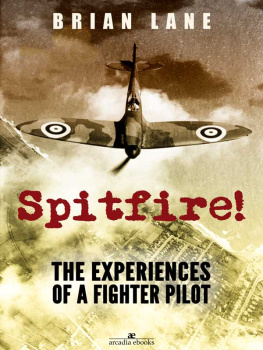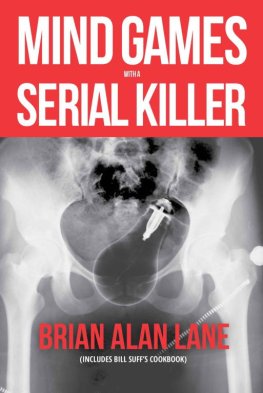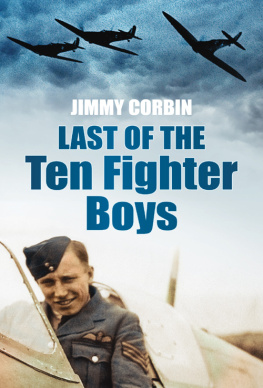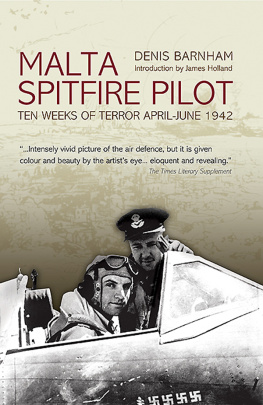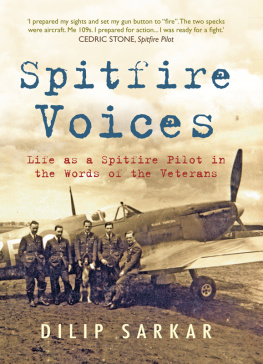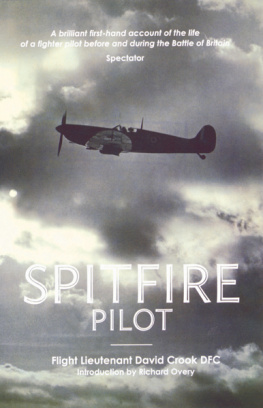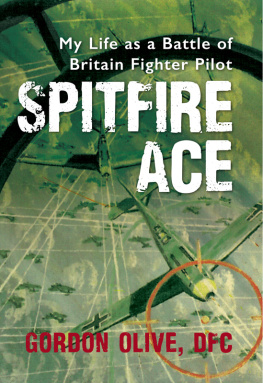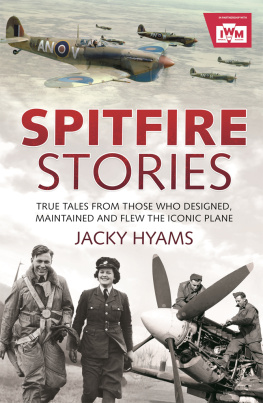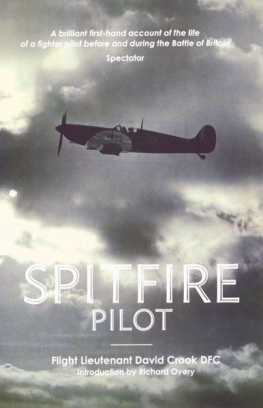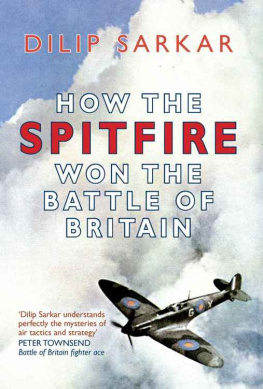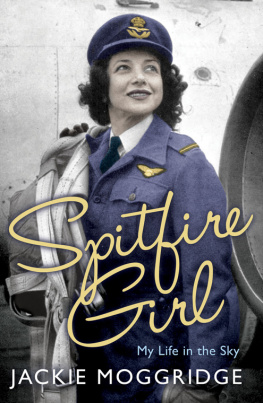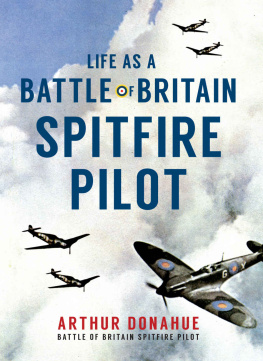AUTHORS NOTE
THE title of this book no doubt tells you what it is about. The name Spitfire first became a household word during the Blitz of last year, but before this these wonderful aircraft had given us valiant service at Dunkirk.
In this book I have set down the experiences of a pilot in a fighter squadron myself. I have been with the squadron since the beginning of the war, first as a flight commander and later as C.O., and I never wish to meet a grander bunch of blokes. We went all through Dunkirk and the Blitz which followed a couple of months later, and in telling my story I have tried to answer the question of the man in the street: What is it like up there? and to give you an idea of what a fighter pilot feels and thinks as he fights up there in the blue.
To any members of the squadron who may read this book, I hope I have not left out any of their pet exploits, but if I have I hope they will bear with me and remember that I have had to write in odd moments after release, etc., and under the difficulty of carrying on with the job in hand at the same time.
So few, Mr. Churchill said but no debt here as he would have you believe; rather few so lucky to be able to get on with the job whilst less fortunate folk looked on and awaited their chance. I think he was really referring to our mess bills, anyway!
In conclusion, I should like to pay tribute to the men who design and build our fighting aircraft. Our successes are their successes, for it is they who have placed in our hands the finest aircraft and equipment in the world. To them we owe a special debt of gratitude.
HOW TO SHOOT A LINE
SHOOTING a line doesnt necessarily refer to shooting Huns, although sometimes it is much the same thing! By writing this book I am shootingaline, in other words, talking about myself, and what I have done. Usually, however, a line is a semi-deliberate exaggeration of a humorous nature a tall story about yourself, if you like. If you write a book or get your name in the paper that is a ginormousline, the strange word being evolved from gigantic and enormous.
Some people shootlines unconsciously all the time, that is, they swank, and everybody soon becomes brownedoff with them, i.e., fed up. The lad who swanks is looked upon as a poortype, whilst a popular chap is a goodtype. There is a lot more general slang, but I wont trouble you with it since you wont find it in the chapters which follow. Instead, Ill deal with the technical terms which may prove difficult to understand.
First take the aerodrome. This is occasionally referred to as thedrome, but more usually as thedeck. Deck also means terra firma in general. As opposed to dry land, the sea is called thedrink.
The correct term for an aeroplane is an aircraft, or in slang akite. To run over thekite, first lets take the undercarriage, invariably referred to as theundercart. Then there are theflaps, which are hinged portions of the wing near the trailing(rear)edge, which act as air brakes and reduce the landing speed of the aircraft.
An aircraft stalls when it has insufficient forward speed for the wings to maintain their lift. If you skim a flat stone over the water, it skims until its speed drops and then sinks or stalls. It is very much the same with an aircraft. The flaps reduce the stalling speed. For instance, a Spitfire stalls with flaps up at 69 m.p.h., and with flaps down at 63 m.p.h. Not an awful lot of difference, you may think, but it makes a world of difference in landing, and you would never get into a small aerodrome if you didnt use the flaps.
I have used the word wings several times above, but the technical term is mainplanes, as opposed to the tailplane. The cockpit is called the office, and the control column just the stick. Rudderbias refers to the trimming tab on the rudder. By winding the biascontrol one way or the other moves the tab and gives port or starboard bias. The elevators on the tailplane have a similar device on them. These are necessary, as the trim of an aircraft varies with its speed and altitude. The trimmers relieve the pilot of the strain of pressing on the stick or rudder bar all the time.
Another thing youll find in the office is the R/T control. R/T is the wireless equipment, consisting of a transmitter and receiver with a three-way switch control, Transmit Off Receive.
Now lets take off. Once airborne, i.e., off the ground, you retracttheundercart, shut the lid, i.e., close the hood, and put the prop or fan into coarse pitch, which on an aircraft is much the same thing as changing gear on a car. (By the way, the prop is never called a propeller. The correct term is airscrew if you dont use the slang words.)
Now supposing you meet some Huns and manage to get on the tail of one of them. If he isnt a very experienced pilot, or if the machine is not very manoeuvrable or well armed, he is easymeat or coldmeat. You press the firing button and givehimasquirt.
If you are unlucky enough to get shot down yourself, you baleout, stepout, or taketothesilk. If you land inthedrink you are wearing a MaeWest, which is a lifesaving waistcoat which gives you curves in the right places! A parachute is called a brolly or a jumpsack.
Well, now you know, and if I were to say that I nearly lostmyprop to-day, I wouldnt mean that it fell off, but that I nearly stalled (stopped) the engine, which would have been a badshow, wouldnt it?
CHAPTER I
LUCK
I AM told that I was born with a silver spoon in my mouth, which they say is a sign of luck. I have certainly been lucky all my life.
When the Hun was plagued with his vile disease a generation ago I could not lend a hand to cure him, my sole activity in this direction being when my nurse showed me what she called a Zeppelin and I blew a very immature raspberry at it. It was probably just one of our own blimps, at that.
In 1939, when the plague seized Europe again, I had another tale to tell. My luck was in.
***
But first of all I must go back a bit to the year 1935, when my story really begins. I was then employed by a big electrical firm, my job being to supervise a dozen or so girls turning out hundreds of electric bulbs. Quite a responsible position for an eighteen-year-old. It was always rather a mystery to me how I got it! However, the experience stood me in good stead. I learned a lot about human nature (and women!) if not much about the manufacture of lamps.
I was not really surprised when one day the powers-that-be informed me that the period of my employment coincided with a decline in their profits, and that if I would kindly leave them they could get along better without me. I complied with this request and went home to my lamenting parents with the additional news that I wanted to try for the R.A.F., which was then in course of expansion.
To want was one thing, to get there another. I filled in and sent off form after form, asking every conceivable sort of question, and then sat back and waited. Nothing happened for a bit, so I started to make a nuisance of myself at Adastral House. So that they shouldnt forget me there I paid such frequent visits that the sergeant at the door began to greet me like an old friend and was always ready with a facetious remark.

